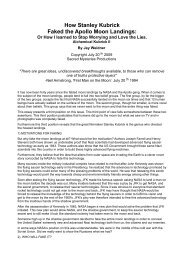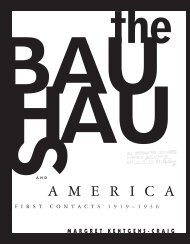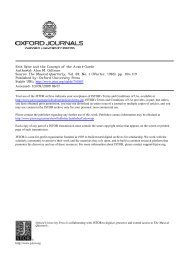- Page 1 and 2:
THE WORLD ORDER: A STUDY IN THE HEG
- Page 3 and 4:
MHP EDITORS PREFACE ABOUT THIS BOOK
- Page 5 and 6:
In "The Greek Way", Edith Hamilton
- Page 7 and 8:
worth from 70 to 100 million florin
- Page 9 and 10:
nations, they reaped huge profits..
- Page 11 and 12:
The New York Evening Post noted Jul
- Page 13 and 14:
embodied the ancient prophecy that
- Page 15 and 16:
ROTHSCHILD INTERESTS IN ENGLAND In
- Page 17 and 18:
4. Lazard Brothers, Shell, English
- Page 19 and 20:
Rio Tinto's chairman is Sir Anthony
- Page 21 and 22:
"In the Panic of 1837, Belmont was
- Page 23 and 24:
famed as "the most powerful banker
- Page 25 and 26:
in-glove with the Harrimans, the Go
- Page 27 and 28:
The Boer War was started by Rothsch
- Page 29 and 30:
Halperin also notes another contrib
- Page 31 and 32:
"On 19 March Chamberlain telegraphe
- Page 33 and 34:
had been married several times, to
- Page 35 and 36:
the most part Spanish or Dutch Jews
- Page 37 and 38:
also invested large sums from his "
- Page 39 and 40:
o o o o o o o Sir William Scawen Si
- Page 41 and 42:
5lb.7d. The leading buyer was Natha
- Page 43 and 44:
G.W. McMahon, deputy governor since
- Page 45 and 46:
THE MERCHANTS OF DEATH AND W ORLD W
- Page 47 and 48:
CARSE: I believe there was some set
- Page 49 and 50:
Throughout the war no action was ta
- Page 51 and 52:
Dr. Ellis Powell told an audience a
- Page 53 and 54:
Victoriano Huerta, the pawn of Lord
- Page 55 and 56:
"MR. GRAHAM: Did the President expr
- Page 57 and 58:
The Baruch War Industries Board (WI
- Page 59 and 60:
of the Reuters Bank, which had been
- Page 61 and 62:
Although the war was going well for
- Page 63 and 64:
America, Dr. James T. Shotwell, Eug
- Page 65 and 66:
already had a group with similar ai
- Page 67 and 68:
The 1934 list of members of RIIA in
- Page 69 and 70:
Shoup's "Imperial Brain Trust", 196
- Page 71 and 72:
approach to some of the great probl
- Page 73 and 74:
The profiteers from the drug trade
- Page 75 and 76:
The Congo empire came into being in
- Page 77 and 78:
Prince Thurn und Taxis also has fou
- Page 79 and 80:
million value. The jewels, belongin
- Page 81 and 82:
Peabody International, and N.M. Rot
- Page 83 and 84:
Although Jacob Schiff's personal ag
- Page 85 and 86:
-- Woodrow Wilson, quoted in "The G
- Page 87 and 88:
power of a totalitarian state, to s
- Page 89 and 90:
mercy, or should we say business ?
- Page 91 and 92:
Lenin said, "The Soviet Union must
- Page 93 and 94:
mother was the daughter of Lord Spe
- Page 95 and 96:
Rothschild & Sons of London, we can
- Page 97 and 98:
These were the organizers of the Wo
- Page 99 and 100:
that Trotsky be released, but the s
- Page 101 and 102:
Standard Oil Bank. As Rockefeller w
- Page 103 and 104:
Covington and Burling, obtaining th
- Page 105 and 106:
The Rockefeller family is sometimes
- Page 107 and 108:
When Nikolai Kruschev, dictator of
- Page 109 and 110:
to the title "most dangerous man in
- Page 111 and 112:
Criminals understand only one law -
- Page 113 and 114:
potential opposition can the parasi
- Page 115 and 116:
CHAPTER 3: FRANKLIN D. ROOSEVELT W
- Page 117 and 118:
Roosevelt was given the opportunity
- Page 119 and 120:
Germany, Hitler was persuaded that
- Page 121 and 122:
plan for an [English] Channel cross
- Page 123 and 124:
and was recently appointed head of
- Page 125 and 126:
It is obvious that they can rack up
- Page 127 and 128:
creating a recession in an election
- Page 129 and 130:
Paul Craig Roberts writes in Busine
- Page 131 and 132:
CHAPTER 4: THE BUSINESS OF AMERICA
- Page 133 and 134:
[German] Reichsbank, the Bank of En
- Page 135 and 136:
The Federal Reserve System printout
- Page 137 and 138:
instead of 130 major U.S. corporati
- Page 139 and 140:
currency. The National City Bank ha
- Page 141 and 142:
These five were combined in a singl
- Page 143 and 144:
careers of two of the nation's best
- Page 145 and 146:
accounts on the 56th floor of Rocke
- Page 147 and 148:
family (New Yorker magazine etc.),
- Page 149 and 150:
addition to George Brown and Anne A
- Page 151 and 152:
o Robert L. Sproull, with the Dept.
- Page 153 and 154:
in 1913; it was first estimated at
- Page 155 and 156:
and E.T. Stotesbury, paid no federa
- Page 157 and 158:
credit contraction, possibly becaus
- Page 159 and 160:
looked for more worlds to conquer.
- Page 161 and 162:
W. Averell Harriman brought to the
- Page 163 and 164:
The New York Times later noted: "Wo
- Page 165 and 166:
Another prominent banking house is
- Page 167 and 168:
They had five sons, known as "the F
- Page 169 and 170:
around the world. He retired as a c
- Page 171 and 172:
Manhattan Corp., and the Organizati
- Page 173 and 174:
On Nov. 17, 1843, the Port of Shang
- Page 175 and 176:
ecause her family was so strongly o
- Page 177 and 178:
the Bureau of Investigation. Instea
- Page 179 and 180:
South Shore of Massachusetts, or at
- Page 181 and 182:
Roosevelt sent Donovan to London wi
- Page 183 and 184:
they'll support us. We can offer ou
- Page 185 and 186:
Col. Stewart Menzies, head of Secre
- Page 187 and 188:
Another son of J.P. Morgan [Jr.], J
- Page 189 and 190:
find no politician willing to buck
- Page 191 and 192:
Bell, who was killed, and Eric Blai
- Page 193 and 194:
agent or mole, but President Gerald
- Page 195 and 196:
Donovan's Washington headquarters,
- Page 197 and 198:
Air Intelligence, SIS, wrote about
- Page 199 and 200:
Administration, run by selfless men
- Page 201 and 202:
the German Marine Corps. In Dec. 19
- Page 203 and 204:
legal representatives of Kuhn, Loeb
- Page 205 and 206:
until he went into Poland and disco
- Page 207 and 208:
figure named Lemaigre-Dubreuil, who
- Page 209 and 210:
international homosexual set who, a
- Page 211 and 212:
hold it in abeyance for future oper
- Page 213 and 214:
served as deputy director of the CI
- Page 215 and 216:
Washington in 1950 as an economist
- Page 217 and 218:
territory) but Hoover lived to see
- Page 219 and 220:
Colombia, Brazil and Poland; he was
- Page 221 and 222:
East pipeline deal with former Secr
- Page 223 and 224:
Lodge was briefed on the "leak", bu
- Page 225 and 226:
flown in. He saved Ho's life by adm
- Page 227 and 228:
of the billion dollar Da Nang airpo
- Page 229 and 230:
previously headed Australia's Nugan
- Page 231 and 232:
Bureau of Narcotics refused to inve
- Page 233 and 234:
companies were absorbed into the Am
- Page 235 and 236:
narcotics factories in operation, w
- Page 237 and 238:
covert funds, laundering huge sums
- Page 239 and 240:
"Shultz is the fourth member of Bec
- Page 241 and 242:
price increases inflicted upon the
- Page 243 and 244:
"Increasingly sensitive to accusati
- Page 245 and 246:
no autopsy. Someone in the Kremlin,
- Page 247 and 248:
Oil and Kaiser, firms in which he h
- Page 249 and 250:
Arabian operations, C. Stribling Sn
- Page 251 and 252:
Dillon, Read, named him Under Secre
- Page 253 and 254:
Defense Weinberger was vice preside
- Page 255 and 256:
perhaps because of its well known C
- Page 257 and 258:
The World Order controls the citize
- Page 259 and 260:
this type of despotism, the most ef
- Page 261 and 262:
Many eunuchs who became a liability
- Page 263 and 264: Because of its international connec
- Page 265 and 266: Germany 1897-1902. His final legacy
- Page 267 and 268: Consequently, it was not without em
- Page 269 and 270: "For all who know anything of the s
- Page 271 and 272: Jerome D. Greene, secretary of Harv
- Page 273 and 274: On Aug. 29, 1908, the Democratic Na
- Page 275 and 276: PRESIDENTS: George E. Vincen
- Page 277 and 278: AND SOUTHERN EDUCATIONAL BOARD 1909
- Page 279 and 280: W ALLACE K. HARRISON, ARCHITECT ROC
- Page 281 and 282: W INTHROP ALDRICH, ROCKEFELLER FAMI
- Page 283 and 284: 61, chmn Naval Warfare panel 1967-7
- Page 285 and 286: Fund they control government policy
- Page 287 and 288: withholding tax is not a legal noti
- Page 289 and 290: The 1971 list of trustees of the Ro
- Page 291 and 292: Board, which had dictatorial powers
- Page 293 and 294: Present directors of Brookings incl
- Page 295 and 296: "It has always been a tradition tha
- Page 297 and 298: Covington, a Maryland congressman,
- Page 299 and 300: and lawyers who function as front m
- Page 301 and 302: Judicial Organization at the U.N. S
- Page 303 and 304: Hedley Donovan, Rhodes Scholar, dir
- Page 305 and 306: Helene L. Kaplan, lawyer with Webst
- Page 307 and 308: academic life, and communications i
- Page 309 and 310: [Note that this was written before
- Page 311 and 312: Boston, Champion and Honeywell. Pre
- Page 313: on War, Peace and Revolution. The H
- Page 317 and 318: The "Report of the National Committ
- Page 319 and 320: 'Herbert Hoover is the most interes
- Page 321 and 322: Robert Grant of the U.S. Food Admin
- Page 323 and 324: Despite his charitable preoccupatio
- Page 325 and 326: permitted to leave only with the cl
- Page 327 and 328: University. The New York Times note
- Page 329 and 330: 30, 1941, a new 14 story, 210 ft. b
- Page 331 and 332: Packard, to start an electronics co
- Page 333 and 334: Hoover. Also at the Hoover was Stef
- Page 335 and 336: Alan Greenspan, president Economics
- Page 337 and 338: "Honegger Hotline: Pres. aide Barba
- Page 339 and 340: into a tax corral from which they c
- Page 341 and 342: University. They were later hired b
- Page 343 and 344: was sponsored by the Cato Institute
- Page 345 and 346: William Simon, director Citibank, f
- Page 347 and 348: Robert Nisbet, John Dewey lecturer
- Page 349 and 350: In 1953, the Ford Foundation set up
- Page 351 and 352: director Chase Manhatten Bank, R.H.
- Page 353 and 354: Glen E. Watt, of AFL-CIO, member Cl
- Page 355 and 356: Tavistock Institute developed the m
- Page 357 and 358: The "experiment" in compulsory raci
- Page 359 and 360: writing in the Washington Post Aug.
- Page 361 and 362: in the 16th century; the present Ea
- Page 363 and 364: kulaks, and to starve them out. The
- Page 365 and 366:
commit them to do "charitable" work
- Page 367 and 368:
After gaining control of the nation
- Page 369 and 370:
should there be a World Order? Is i
- Page 371 and 372:
way can the World Order maintain it
- Page 373 and 374:
It has taken centuries of patient e
- Page 375 and 376:
The great American fortunes origina
- Page 377 and 378:
Sir Walter Raleigh, a patriot, saw
- Page 379 and 380:
from American foundations, houses G
- Page 381 and 382:
Madison during the War of 1812, and
- Page 383 and 384:
the fine arts for object. Then infi
- Page 385 and 386:
In October, 1926, Governor Emile Mo
- Page 387 and 388:
it at his disposal to achieve World
- Page 389 and 390:
immediately recognizing each other
- Page 391 and 392:
European and American population wi
- Page 393 and 394:
Freudian psychology was developed b
- Page 395 and 396:
Therefore, the parasite carefully i
- Page 397 and 398:
syndicate censors all thought and m
- Page 399 and 400:
abolish the present political and s
- Page 401 and 402:
is Slavery, Ignorance is Strength".
- Page 403:
determination to gradually weaken a



